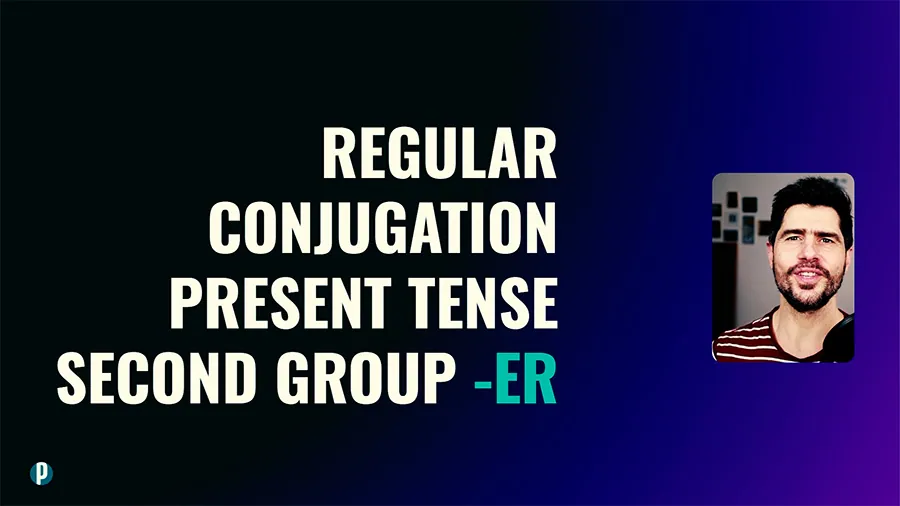वर्तमान काल में पुर्तगाली नियमित क्रियाएँ
अंग्रेजी की तुलना में पुर्तगाली क्रियाएं सीखना वास्तव में अधिक बोझिल है। एक रोमांस भाषा होने के नाते, पुर्तगाली में नज़र रखने के लिए क्रिया रूपों की कमी नहीं है।
Fortunately, there are plenty of regular verbs as well, that is, verbs following a regular pattern concerning their conjugation. This means that you can learn and apply a conjugation “formula” that works with any regular verb. Neat.
पुर्तगाली में, नियमित क्रियाओं को 3 संयुग्मन समूहों में वितरित किया जाता है:
| 1st conjugation: -AR (Acordar) | 2nd conjugation: -ER (Mexer) | 3rd conjugation: -IR (Partir) | |
| Eu | acordo | mexo | parto |
| Tu | acordas | mexes | partes |
| Ele, ela, você | acorda | mexe | parte |
| Nós | acordamos | mexemos | partimos |
| Vocês | acordam | mexem | partem |
| Eles, elas | acordam | mexem | partem |
निम्नलिखित में, मैं आपको संयुग्मन पैटर्न के बारे में अधिक विस्तार से बताऊंगा। अर्थात्, हम कुछ छोटे वर्तनी समायोजनों पर गौर करते हैं जो कभी-कभी वर्तमान काल के पहले व्यक्ति में होते हैं। पढ़ते रहिये।
यहाँ के लिए एक अनुरूप लेख है past tense: भूतकाल में पुर्तगाली नियमित क्रियाएँ.
नियमित संयुग्मन
किसी भी नियमित क्रिया को वर्तमान काल में संयोजित करने के लिए, हटा दें इनफिनिटिव का अंत - या तो –ar, –er, या –ir - और इसके बजाय, स्टेम में निम्नलिखित अंत जोड़ें (बोल्ड में चिह्नित):
| 1st conjugation: -AR (Pensar) | 2nd conjugation: -ER (Vender) | 3rd conjugation: -IR (Abrir) | |
| Eu | penso | vendo | abro |
| Tu | pensas | vendes | abres |
| Ele, ela, você | pensa | vende | abre |
| Nós | pensamos | vendemos | abrimos |
| Vocês (vós)* | pensam (pensais) | vendem (vendeis) | abrem (abris) |
| Eles, elas | pensam | vendem | abrem |
| Other commonly used regular verbs | ficar, andar, falar, chegar, costumar, gostar, morar | comer, beber, querer, dever, correr, viver | partir, existir, sentir, dormir |
* आधुनिक पुर्तगाली में, 2- और 3-व्यक्ति बहुवचन एक ही क्रिया रूप साझा करते हैं। आप कभी-कभी सर्वनाम के साथ एक पुराना संस्करण (उपरोक्त तालिका में कोष्ठक में संलग्न) सुन सकते हैं vós. चूंकि इसका उपयोग दुर्लभ होता जा रहा है, मुझे नहीं लगता कि आपको इसे सीखने की जहमत उठानी चाहिए।
मामूली वर्तनी समायोजन
इसमें कुछ क्रियाएँ हैं -ir वह समूह जिसका संयुग्मन उपरोक्त पैटर्न का अनुसरण करता है पहले व्यक्ति को छोड़कर - ये ऐसी क्रियाएं हैं जिनमें या तो एक है e या एक o उनके तने में.
इतना e और o बनना i और u (क्रमशः) पहले व्यक्ति में। कुछ उदाहरण निम्नलिखित हैं:
| e to i | |
| despir | eu dispo, tu despes, ele despe, etc. |
| mentir | eu minto, tu mentes, ele mente, etc. |
| preferir | eu prefiro, tu preferes, ele, prefere, etc |
| o to u | |
| cobrir | eu cubro, tu cobres, ele, cobre, etc. |
| dormir | eu durmo, tu dormes, ele dorme, etc. |
| tossir | eu tusso, tu tosses, ele tosse, etc. |
इसके अलावा, अगर एक का तना -er या -ir क्रिया समाप्त होती है -c, -g, या –gu, ये व्यंजन बदल जाते हैं -ç, -j, और g क्रमशः वर्तमान काल के पहले व्यक्ति में (मूल व्यंजन ध्वनि को संरक्षित करने के लिए*):
| c to ç | |
| conhecer | eu conheço, tu conheces, ele conhece, etc. |
| parecer | eu pareço, tu pareces, ele parece, etc. |
| g to j | |
| fugir | eu fujo, tu foges, ele foge, etc. |
| agir | eu ajo, tu ages, ele age, etc. |
| gu to g | |
| conseguir | eu consigo, tu consegues, ele consegue, etc. |
| seguir | eu sigo, tu segues, ele segue, etc. |
* पुर्तगाली ध्वनिविज्ञान और वर्तनी-ध्वनि पैटर्न के बारे में और जानें: यूरोपीय पुर्तगाली उच्चारण - पुर्तगाली ध्वन्यात्मकता और वर्तनी-ध्वनि पैटर्न के लिए संपूर्ण मार्गदर्शिका.
10 गैर-नियमित क्रियाएँ जिन्हें आप सीखना चाहते हैं
वर्तमान काल में वास्तव में कई नियमित क्रियाएं हैं (प्रथम-संयुग्मन समूह अब तक का सबसे बड़ा है)। हालाँकि, सबसे व्यापक रूप से उपयोग की जाने वाली कुछ पुर्तगाली क्रियाएँ अनियमित होती हैं।
यहां 10 पुर्तगाली अनियमित क्रियाएं हैं जिन्हें आपको याद रखना चाहिए:
| ser (be) | sou, és, é, somos, são |
| estar (be) | estou, estás, está, estamos, estão |
| ter (have) | tenho, tens, tem, temos, têm |
| haver (there is) | há |
| dar (give) | dou, dás, dá, damos, dão |
| pôr (put) | ponho, pões, põe, pomos, põem |
| ir (go) | vou, vais, vai, vamos, vão |
| fazer (do, make) | faço, fazes, faz, fazemos, fazem |
| poder (can) | posso, podes, pode, podemos, podem |
| saber (know) | sei, sabes, sabe, sabemos, sabem |
युक्तियाँ पढ़ना! व्यापक रूप से प्रयुक्त क्रियाओं की बात हो रही है। यहां कुछ पाठ दिए गए हैं जो आपको पुर्तगाली का बेहतर उपयोगकर्ता बना देंगे:
• पुर्तगाली को अनियमित क्रियाओं को अवश्य जानना चाहिए
• पुर्तगाली क्रिया "फ़िकार" का अधिकतम उपयोग करना: रूंडाउन और संयुग्मन का उपयोग
• पुर्तगाली क्रिया "हैवर" और इसके साथ आप जो कुछ भी कहते हैं वह सब
• पुर्तगाली क्रिया "डार": उपयोग और मुहावरेदार अभिव्यक्तियाँ
• पुर्तगाली क्रिया सेर बनाम एस्टार: कैसे और कब उपयोग करें

Olá! I'm Pedro and I'm your Portuguese teacher.
Learning European Portuguese? Portuguesepedia is an all-in-one platform providing a wealth of learning resources, from bite-sized video lessons to immersive idiomatic dips. Perfect your pronunciation and listening comprehension with listening drills and solidify your grammar with in-depth articles. Start your Portuguese journey today!
Share this article
Get my guide "Key Strategies to Learn Portuguese" for FREE.




